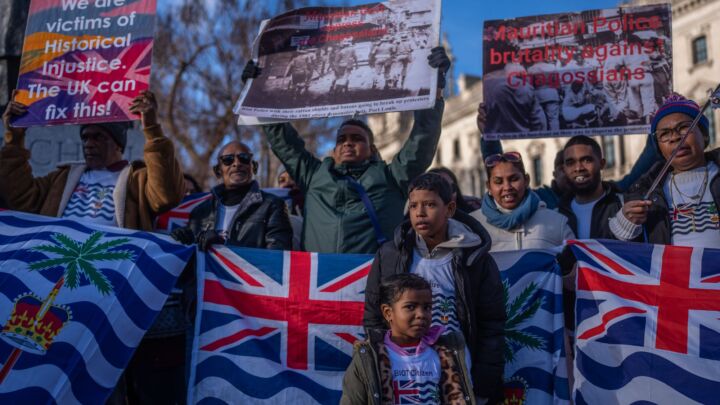The tyranny of the crybully
Trans activists and Israelophobes are weaponising victimhood against their opponents.

Want unlimited, ad-free access? Become a spiked supporter.
The politics of victimhood has been with us for some time now. And like wokery, rather than showing signs of dying out, it looks like it’s here to stay. Indeed, when it comes to a stance that combines self-pity, mawkishness, grievance and a thirst for vengeance, victimhood politics appears in ruder health than ever.
This is clear from events taking place on the fringes of British politics. Namely, the attempts of the unnamed party headed by Zarah Sultana and Jeremy Corbyn – already an unlikely coalition of antediluvian far-leftists, young ultra-progressives, pro-Palestine activists and elder Muslims with deeply conservative views – to forge an alliance with Zack Polanski’s Green Party, an organisation that finds its traditional core support among wealthy, painfully ‘caring’ middle-class types.
On the face of it, there’s not much to bring together these factions. Yet they are united in their passion for one thing: waving the Palestinian flag.
We’ve heard much talk of flags this year, but the emergence and proliferation of this particular icon is perhaps the most significant. This was brought home by its over-abundance at Glastonbury festival this summer, where the meaning of the Palestinian flag became palpable: it now serves to demonstrate that you support victims against oppressors, the weak against the strong, good against evil. That’s why the assembled multitudes saw nothing wrong with chanting Jew-killing slogans, such as ‘Death, death to the IDF’. They were on the side of the angels against the perpetrators of ‘genocide’. The Palestinian flag is now the global symbol of the victim.
Victimhood is much sought-after for good reasons. Nothing can gainsay the righteous fury of the victim who suffers – the victim who has right on his side and whose every response and deed can therefore be permitted. The victim feels wronged by an unjust and cruel world and we must feel his pain. Those who question the motives of the victim can be angrily dismissed as cruel, heartless or accomplices of the oppressors themselves.
Nothing can satiate the thirst for vengeance the victim gleefully seeks. Armed with self-righteousness, the victim can behave as he pleases, harassing and threatening others while protesting it is he who is under attack. The victimhood activist today is personified in the figure of the crybully – a term coined by Julie Burchill.
It’s a seductive mindset and unbeatable formula, which is why we’ve seen it in all its gruesomeness in recent years. The dubious #MeToo movement of the past decade was allowed to gain traction because no one dared oppose or doubt the claimants seeking recompense against their transgressors. The belligerent self-righteousness of the Black Lives Matter movement was of a similar ilk and was indulged for the same reasons. Radical trans activists, as Graham Linehan knows only too well, made great political advances by portraying themselves as persecuted martyrs who just wanted to ‘be nice’ and stop kids from killing themselves.
And it’s going on right now in Britain in its most egregious and cunning form, with attempts to define and encode ‘Islamophobia’, a term that seeks to shield any criticism of Islam or Muslims by ringfencing each under the category ‘persecuted and oppressed’.
The identitarian right also drinks deep from this well of self-pity and resentment.
None of this is particularly new. Much of the philosophy of Friedrich Nietzsche centred on the self-righteousness of the persecuted and the psychology of resentment. Writing in 1888 of the desire for ‘justice’ (that is, vengeance) then preached by many Christians and socialists, he concluded: ‘What is common to both, and unworthy in both, is that someone has to be to blame for the fact that one suffers – in short, that the sufferer prescribes for himself the honey of revenge as a medicine for his suffering… this thirst for revenge as a thirst for pleasure.’
Young people are more patriotic than you think
Ever since Britain left the European Union, it’s been received wisdom among the most fanatical Remoaners that, as the older generation which mostly voted Leave in 2016 gradually dies out, and is replaced by a more enlightened younger breed of less jingoistic Brits, the UK will inevitably rejoin the EU.
A survey published by The Sunday Times last weekend, showing that teenagers today are more proud to be British than their parents, would therefore have made uncomfortable reading for Remoaners. The survey, revealing that 16- and 17-year-olds today are more patriotic than the public overall, showed that boys, in particular, felt more proud of their country.
It’s hardly a shock that adolescents are rebelling, especially white boys. Imagine being reared on a curriculum in which you’ve been taught that you are a dreadful specimen merely on account of your skin pigmentation or biological sex, and that your country has been responsible for all the horrors in history? You, too, would be in revolt.
Remoaners had based their hopes on a Whig view of history – the belief that civilisation will become ever-more ‘enlightened’, as they would see it, with the course of time. That conceit was rudely dispelled in the 20th century, with all its carnage and destruction.
This survey supports a more commonsensical observation: teenagers simply rebel against their parents and their beliefs.
The lost art of swearing
The first episode of comedy sketch show Mitchell and Webb Are Not Helping on Channel 4 last Friday was noteworthy – chiefly, for its profusion of bad language. Indeed, profanity was the basis of its Australian ranchers sketch, which consisted wholly of the cast issuing expletive after vulgar expletive.
Whether this was meant to be a nod to, or parody of, the cliché that Australians are sweary and crude, or just a childish ruse to elicit nervous giggles, who knows, but it did make me laugh.
Making expletives funny is a difficult art. Harsh words need to be used imaginatively and judiciously to render them amusing. I still subscribe to the school of thought that profanities are best deployed not with profusion, but sparingly. And for maximum effect, they should take you by surprise.
Think of the quintessentially suburban and bland Alan Partridge catching his fellow radio DJ David Clifton off-guard with that rare riposte, ‘Oh fuck off’. Near-identical words were uttered by the mild-mannered and mistaken messiah in Life of Brian – addressed to his devotees no less – and to devastating comic effect. Or think of that unforgettable reproach from our eponymous anti-hero in Withnail and I: ‘Monty you terrible cunt!’
When it comes to profanities, less is more. That’s an old-fashioned point of view, to be sure, but aren’t comedy sketch shows themselves old-fashioned?
Patrick West is a spiked columnist. His latest book, Get Over Yourself: Nietzsche For Our Times, is published by Societas.
£1 a month for 3 months
You’ve hit your monthly free article limit.
Support spiked and get unlimited access.
Support spiked – £1 a month for 3 months
spiked is funded by readers like you. Only 0.1% of regular readers currently support us. If just 1% did, we could grow our team and step up the fight for free speech and democracy.
Become a spiked supporter and enjoy unlimited, ad-free access, bonus content and exclusive events – while helping to keep independent journalism alive.
———————————————————————————————————————————–
Exclusive January offer: join today for £1 a month for 3 months. Then £5 a month, cancel anytime.
———————————————————————————————————————————–
Monthly support makes the biggest difference. Thank you.










Comments
Want to join the conversation?
Only spiked supporters and patrons, who donate regularly to us, can comment on our articles.